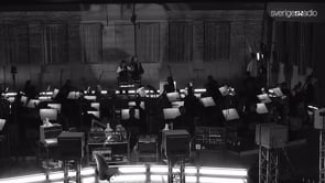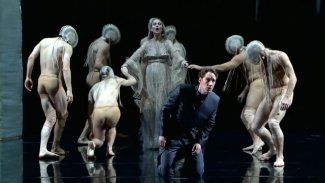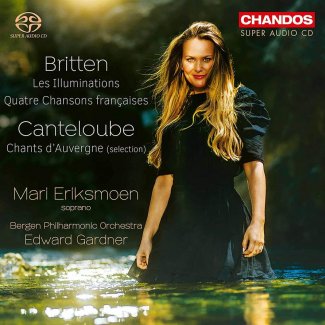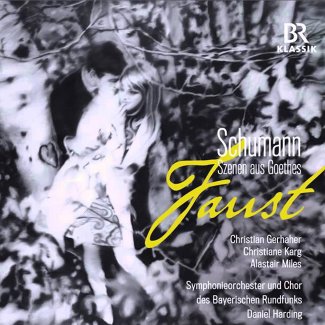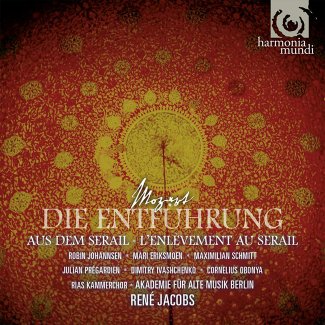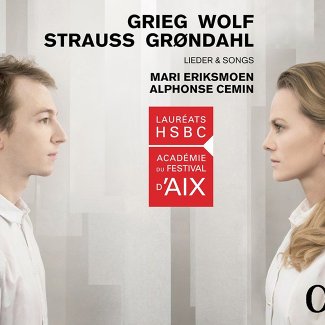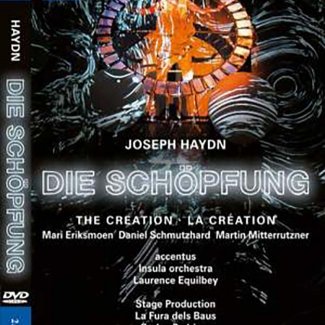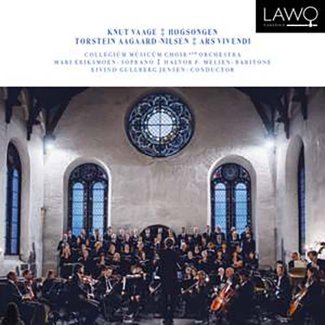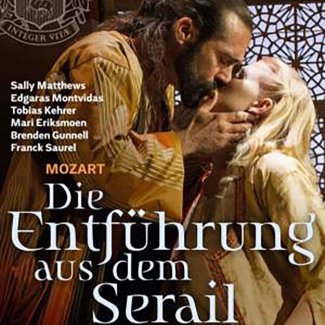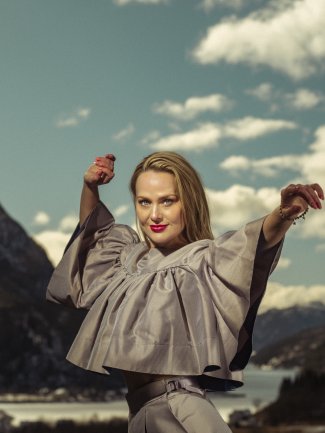

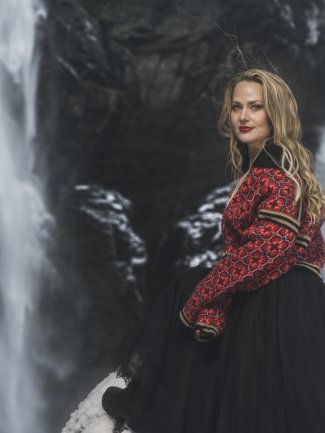
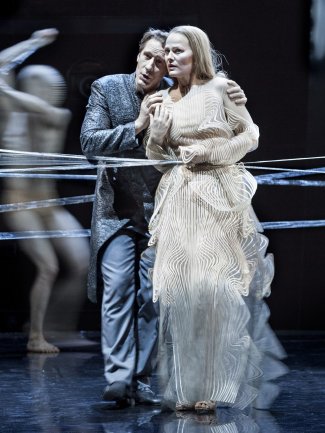
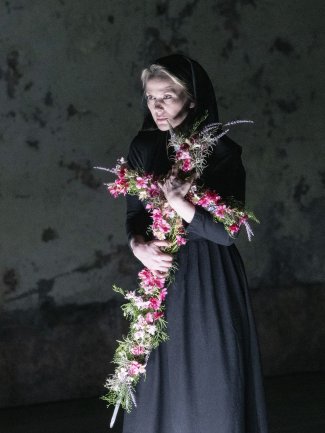
Mari Eriksmoen
Links
Download Assets
“The recording captures the crystalline yet supple quality of her voice and her direct, communicative way with text.”
(The Guardian)
Mari Eriksmoen’s exquisite musicianship and impressive versatility have led to a blossoming career on Europe’s premiere opera, concert, and recital stages alongside enduring collaborations with many key orchestras, conductors, and directors.
In recent seasons Eriksmoen has had great success in new roles including as Anne Trulove (The Rake’s Progress) and Blanche de la Force (Dialogues des Carmelites) at Den Norske Opera, Zabelle in George Benjamin’s Picture a Day like This at Tiroler Festspiele Erl, and as Costanza in a new production of Griselda at The Royal Danish Theatre. She further performed the title role in L’incoronazione di Poppea with Ensemble I Gemelli, Gerda in Hans Abrahamsen’s The Snow Queen at Amsterdam’s Het Concertgebouw under Kent Nagano, Cleopatra in Giulio Cesare at Festival d’opéra baroque de Beaune and Romilda in a new production of Xerxes at Opéra de Normandie Rouen. As Donna Anna (Don Giovanni) she joined Swedish Radio Symphony Orchestra under Daniel Harding and she marked her debut at Salzburger Festspiele as Isacco in Myslivecek’s rarity Abramo ed Isacco with Collegium 1704, conducted by Václav Luks.
Show More
In the 2025/26 season, Mari Eriksmoen revives her acclaimed Mélisande in Sidi Larbi Cherkaoui’s evocative production at Grand Théâtre de Genève, conducted by Juraj Valčuha and joins Orchestra Sinfonia Siciliana in performances of Giulio Cesare. She makes role debuts as Circula in Blitzstein’s Parabola and Circula with the Norrköping Symphony Orchestra under Karl-Heinz Steffens, and as Asteria in Händel’s Tamerlano at the Karlsruhe Händel-Festspiele with René Jacobs.
In concert this season, Eriksmoen appears at Edinburgh International Festival in Mendelssohn, Elijah with Thomas Søndergård and at Bergen International Festival in Beethoven, Symphony No.9 under Jan Willem de Vriend. She returns to Tonhalle-Orchester Zürich for a European tour and recording of Mahler Symphony No.2 under Paavo Järvi, joins Deutsche Symphonie-Orchestra Berlin under Dalia Stasevska for Mendelssohn’s A Midsummer Night’s Dream, performs Irgen-Jensen’s Japanischer Frühling with Oslo Philharmonic Orchestra under Jukka-Pekka Saraste and brings in the New Year as soloist in celebratory concerts with Swedish Radio Symphony Orchestra.
Eriksmoen’s operatic ascent was launched by her dazzling debut as Zerbinetta in Ariadne auf Naxos at Theater an der Wien, a performance that marked the start of her enduring relationship with Vienna’s historic stage. Her return engagements showcase her versatility with standout portrayals of Olympia (Les contes d’Hoffmann), Euridice (L’Orfeo), Servilia (La clemenza di Tito), Agilea (Teseo), and as Susanna, Zerlina and Fiordiligi in the Da Ponte Trilogy under the baton of the late Nikolaus Harnoncourt. Her breakthrough as Mélisande in Pelléas et Mélisande at Opera Vlaanderen under Alejo Pérez earned her widespread acclaim and led to celebrated performances of the role at Grand Théâtre de Genève, Grand Théâtre de Luxembourg, and Teatro de la Maestranza in Seville. Eriksmoen’s further performances include Pamina (Die Zauberflöte) in Simon McBurney’s acclaimed staging, Marzelline (Fidelio), La Fée (Cendrillon), Susanna (Le Nozze di Figaro), Sophie (Der Rosenkavalier), Ilia (Idomeneo) and Waldvogel in Daniel Barenboim’s epic Ring Cycles at Teatro alla Scala.
Concert highlights include Britten Les Illuminations under Edward Gardner at Den Norske Oper, Grieg’s Peer Gynt with Orquesta y Coro de RTVE and Thomas Dausgaard, Haydn’s Cäcilienmesse with Kammerorchester Basel under René Jacobs, Mendelssohn’s A Midsummer Night’s Dream with Berliner Philharmoniker and Ivan Fischer and Mahler Symphony No.8 with Oslo Philharmonic Orchestra and Jukka-Pekka Saraste. In Mahler’s Symphony No.2, Mari Eriksmoen recently appeared at the BBC Proms with The Hallé conducted by Kahchun Wong, debuted with both Sapporo Symphony Orchestra under Elias Grandy, and Chicago Symphony Orchestra under Neeme Järvi and joined Orchestre de Paris under Klaus Mäkelä Other frequently performed repertoire includes Brahms’ Ein deutsches Requiem with Münchner Philharmoniker and Paavo Järvi, Schumann Das Paradies und die Peri with Gewandhausorchester Leipzig under Philippe Herreweghe, Mahler’s Symphony No.4 with Tonhalle Zürich and Kent Nagano and Beethoven, Symphony No.9 with Wiener Symphoniker and Omer Meir Wellber.
Mari Eriksmoen’s impressive discography includes releases of Britten and Canteloube with Bergen Philharmonic Orchestra and Ed Gardner (Chandos), Handel and Mozart with Stavanger Symphony Orchestra and Jan Willem de Vriend (Challenge Classics), and her debut recital disc with pianist Alphonse Cémin (Alpha). She also appears on Schumann’s Szenen aus Goethes Faust with Symphonieorchester des Bayerischen Rundfunks under Daniel Harding (Naxos) and Mozart’s Die Entführung aus dem Serail with both Akademie für alte Musik Berlin under René Jacobs (Harmonia Mundi) and Glyndebourne Festival Opera under Robin Ticciati (Opus Arte DVD).
Contacts
Shirley Thomson Senior Director, VOICE at HarrisonParrott | Head of CSR
General Management
General Management
Gallery
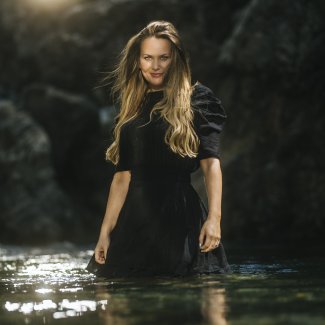


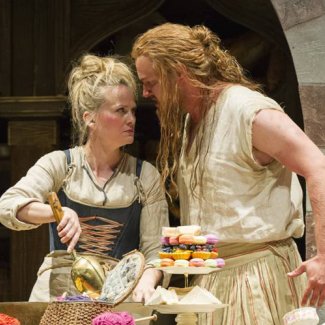
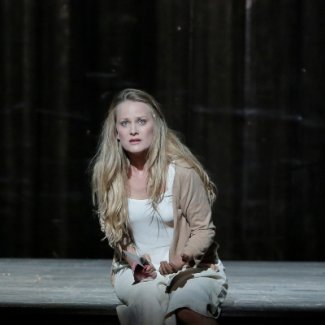
“As Mélisande, Mari Eriksmoen sings with an ethereal lightness and an unforced, silvery line that suits the role’s ambiguity.”
“Mari Eriksmoen played Mélisande as otherworldly in her innocence, her voice liquid and clear, shading into girlishness. The audience went completely still for her goosebump-inducing unaccompanied folksong.”
“Mari Eriksmoen’s bubbly voice exactly suited the movement’s glad tidings, and neatly complemented the hushed reverence emanating from the marvellously blended voices of the Hallé choirs.”
“The wonderful vocal control, tonal beauty and ability to furnish the line with stunning embellishments made soprano Mari Eriksmoen as Costanza the standout performer. Every aria she sang was a sheer delight. Her rendition of “Agitata da due venti” was absolutely superb; not only did she capture the excitement and energy of the piece, but her wonderfully crafted ornamentations, replete with dizzying coloraturas mixed with precise trills and audacious leaps, had the audience transfixed.”
“The rich nuances of Mari Eriksmoen’s vocal line make her a dazzling Costanza whose fresh and vibrant performance contrasts with her rock-solid technique. Her high notes are commanding, her chest voice has a shimmering depth, and the seamless unity of her registers is nothing short of legendary.”
“The soprano Mari Eriksmoen …with her wonderful soprano, rich in overtones. What a beautiful, soulful voice. Soprano brilliance of the highest quality.”
“Mari Eriksmoen offers at every moment the clarity of her voice, her agility, her art of pianissimo and legato … With her red wig, she occupies the stage with conviction and her youthful Romilda effortlessly attracts all hearts to her.”
“Mari Eriksmoen, as Mélisande, was fragile, wondering and beguiling. Her gentle soprano took on force in the love scene, only to become a whisper as she died.”
“After a ringing and forceful Susanna, Mari Eriksmoen attests her versatility with a Zerlina full of calm conviction in her sensitively sung ‘Vedrai carino’. And she also sings Fiordiligi, moving convincingly between registers and acknowledging her final defeat with a touching ‘fa’ di me quell che ti par’.”
“With her complex, ringing soprano, Eriksmoen in particular sings a moving consolation for the bereaved, which Brahms places at the centre [of his Requiem].”
“This new recording [of Britten’s Les illuminations] is highly persuasive. The Norwegian soprano delivers highly animated performances…She attacks ‘Royauté’ and ‘Marine’ with insouciant swagger, while ‘Being Beauteous’ is urgently phrased”
“Soprano Mari Eriksmoen embodies Marzelline with character while maintaining a youthful freshness. Her pure timbre reveals delicate high notes and a delightful vibrato, delivering an interpretation full of nuance, including in the strong opening duet with Jaquino, where her sharp diction and precise rhythm successfully translates her character’s frustrations.”
“Mari Eriksmoen is a delicious Marzelline, her warm, fruity voice unfolds with grace and naturalness in a role to which she gives real depth.”
“Mari Eriksmoen is distinguished by an exquisite musicality, a radiant line of singing endowed with an even ethereal tone”
“she is a star here…The runs in the martial aria from Mitridate are perfectly placed, as they are in Donna Anna’s ‘Non mi dir’. Eriksmoen captures the restlessness of Ilia’s first aria and she sounds suitably vengeful in Alma grande e nobil core…enjoy the top-drawer singing.”
“Norwegian soprano Mari Eriksmoen presents a recital of arias by Handel and Mozart…and the focus, after all, is Mari Eriksmoen’s voice, it is superb. The natural grace of the light, agile and confident soprano, the cultivated declamation and fresh liveliness, but also the often moving empathy of her singing show an artist who fully convinces with a stylistically confident musicality.”
“Mari Eriksmoen as Servilia presented a fresh, sweet sound”
“With her precise and clear timbre, soprano Mari Eriksmoen firmly establishes her ability with this music. With great sensitivity and very flexible phrasing, her voice builds in “Ah no lasciarmi, no” at the mention of the departure of her lover and she finishes the aria beautifully at the top of her range. In “Ridente la calma”, she brings a more voluptuous tone, complementing the caressing bass.”
“Mari Eriksmoen (Servilia) exudes a youthful timbre, which assures linden beauty of the only catchy tune of the evening.”
“Equally impressive is Mari Eriksmoen as Servilia. Technically perhaps the cleanest voice of the evening, excellently supported especially at the top of the range, and artistically at the highest level, Eriksmoen puts an explicit exclamation mark after her name! In her aria ‘S’altro che lacrime,’ the Norwegian soprano sings so emphatically that crying does not help, but the audience was close to tears at this gorgeous vocal performance.”
“The Norwegian soprano Mari Eriksmoen brings a pure, clean sound and playful character to Susanna.”
“Soprano Eriksmoen is the heart and lifeblood of Waiting. Her voice is radiant; her performance, breathtaking.”
“Mari Eriksmoen and [her Tamino] made a wonderful princely couple, both looking and sounding beautiful…Eriksmoen was just as clear, just as unforced and showed how Mozart can tug at the heartstring”
“Mari Eriksmoen is a Pamina who combines grace with determination, a pure voice but with strength, and a dancer’s elegance”
“Mari Eriksmoen is a delicate, sensitive Pamina”
“The most magnificent in the cast was the Mélisande of Mari Eriksmoen, a lyrical soprano who sings with perfect clarity. With her lithe silhouette and Scandinavian looks, she fully embodies the fascinating heroine, at once fragile and extremely determined”
“The big star in Debussy’s Pelléas et Mélisande is Mari Eriksmoen. The Norwegian soprano impresses from the opening scene right up to her deathbed”
“Soprano Mari Eriksmoen is a clear-voiced Mélisande and perfectly portrays the exceptional nature of this almost extra-terrestrial character”
“Mari Eriksmoen dominates the cast with an almost perfect Mélisande in her debut performance”
“In the role of Mélisande, the Norwegian soprano Mari Eriksmoen makes a resoundingly impressive debut at Opera Vlaanderen: her French diction was faultless, her voice like crystal, and she embodies the hypnotising fragility of this heroine to perfection.”
“A delicate, diaphanous beauty and Scandinavian blonde, the radiant Norwegian soprano Mari Eriksmoen succeeds in her debut as Mélisande”
“Mari Eriksmoen has the agile freshness of Hanne [Haydn’s The Seasons], a pure voice sometimes reminiscent of a Gundula Janowitz.”
“Mari Eriksmoen’s lip-biting Zerlina left no doubt as to her being an ideal first choice in her highly-charged, kittenish reading…Vocally sailing through the part, this Zerlina whet one’s appetite for greater challenges to come.”
“Zerlina is the focus of the cast. Mari Eriksmoen sings the role with her clear, flexible and wonderfully coloured soprano”
“The performance is led by Mari Eriskmoen as a charming Zerlina”
“Mari Eriksmoen, with her bright and agile soprano, is an ideal Zerlina”
“Mari Eriskmoen was especially successful in creating a thoroughly strong character in Zerlina”
“Mari Eriksmoen is a suitably fearless Blonde.”
“Radiating an abundance of melodious sound and filling the theatre is Mari Eriksmoen as La Fée, with her magically mellifluous coloratura”
“[As La Fée], Mari Eriskmoen produces the most alluring, shimmering coloratura; pure magic.”
“Rising soprano Mari Eriksmoen has chosen her repertoire for this disc well…Her selection of nine songs by Hugo Wolf emphasises a sense of mischief, and the recording captures well the crystalline yet supple quality of her voice and her direct, communicative way with text. Her Strauss selection includes three of the Ophelia Songs, which she makes sound at once confiding and otherworldly…Eriksmoen is even more persuasive in her native Norwegian. Five songs by Grieg find her relishing each word – A Bird’s Song sounds especially posied and elegant.”
“Mari Eriksmoen was a Blonde to rival that of Lucia Popp in the old Josef Krips recording, the stage presence a continual source of vitality and the beauty of tone endlessly beguiling.”
“Mari Eriksmoen [gave a] beautifully-sung live-wire performance as Blonde.”
“Mari Eriksmoen has a clear, agile soprano and light vibrato with which she spun fine pianos and gave a credible depiction of the caring, boisterous and naïve girl.”
“The Norwegian soprano Mari Eriksmoen was lively and vocally excellent as Rosina.”


